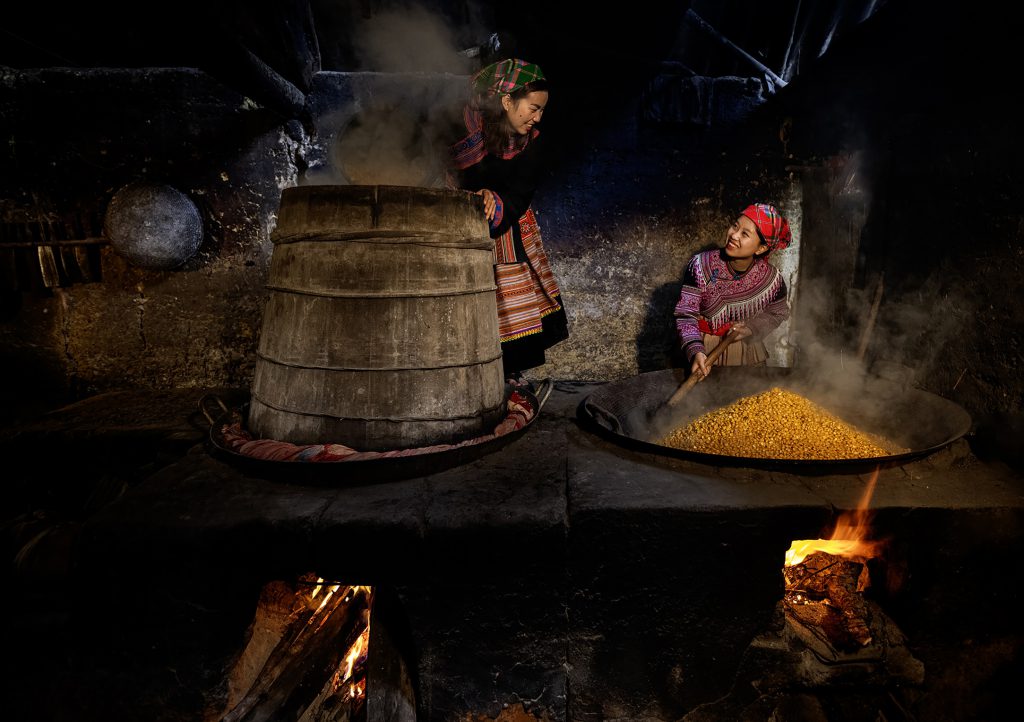This story was adapted from “The Treasury of “Vietnamese Folk Tales”
Illustrator : Nguyen Van Duc
Once upon a time, a kind disciple left home to study with a wise scholar. After spending three years with this master, the young disciple longed to return home. He asked the scholar for permission to leave.

The scholar scrutinised his disciple’s palm and said: “If you must go, be careful. Your future is full of bad omens. Please follow my advice to avoid calamity:
Never take shelter in a communal temple.
Never wash your hair with herbal water.
Never drive away chickens.
Never blame Three, Four and Six.”
The disciple memorised this list of rules and set off.
He was on a deserted hillside when it began to rain. He saw an ancient communal temple with some other guests huddled inside. As he rushed towards it, he recalled his master’s first piece of advice and stopped. Those huddled inside said:
“Come quickly! You are getting wet!”
But the disciple replied: “My master warned me not to shelter inside a communal temple. Please get out!”

The others laughed at the young man standing in the rain. But then, without warning, the temple collapsed, killing those inside. The disciple mourned the lost travellers before continuing towards home.
While the disciple was away, his wife had an affair with another man. The pair hoped to marry and conspired to kill the unsuspecting disciple. When the disciple returned, his wife’s lover told her: “Add these herbs to the water he uses to wash his hair. I will take care of the rest tonight.”

The wife prepared the herbal water and instructed her husband to wash his hair. But recalling his master’s warning, the disciple refused. Not wanting to waste the herbal water, his wife washed her own hair with it. That night, while the couple slept, the wife’s lover crept into their dark room with a sharp dagger. The room was pitch black but he could smell the herbal water on the wife’s hair and quickly sliced her throat. Upon realising he’d killed the wrong person, he fled in terror.
The disciple was so tired that he slept through the murder. To his horror, he woke to find his wife dead and began to cry. Villagers rushed in. Some suspected he had killed her. The village guards dragged him to court. Despite days of torture, the disciple insisted he was innocent. But with no better suspects, he remained in jail. One day, the prisoners were given rice to grind. The disciple was told to guard the chickens. At the sight of the rice, the chickens rushed over. The disciple remembered his master’s advice and allowed the chickens to eat the rice without driving them away. Upon seeing this, the guards beat him.

A mandarin was sitting in the court and heard the disciple’s cries. He came to investigate: “Guarding chickens is an easy task, why don’t you do it?” he asked.
The disciple explained: “Sir, my master gave me four pieces of advice for the sake of my own safety. I followed the first two and avoided calamity. So I could not help but follow the third one.”

“What were they?” asked the mandarin.
The disciple explained his master’s first three rules, and how they had saved his life.
“So what was the fourth rule?” asked the mandarin
“Sir, it’s ‘Never blame Three, Four and Six’,” replied the disciple.
That night the mandarin kept thinking about the fourth rule: Never blame Three, Four and Six. That means he should blame Five! Did a man named Five kill the disciple’s wife? The next morning the mandarin ordered the local authorities to seek a man named Five in the village.
Sure enough, the dead wife’s lover was named Nam (Five). Seeing the soldiers coming to arrest him, he thought his lover’s ghost must have identified him. He was so terrified that he confessed immediately.










